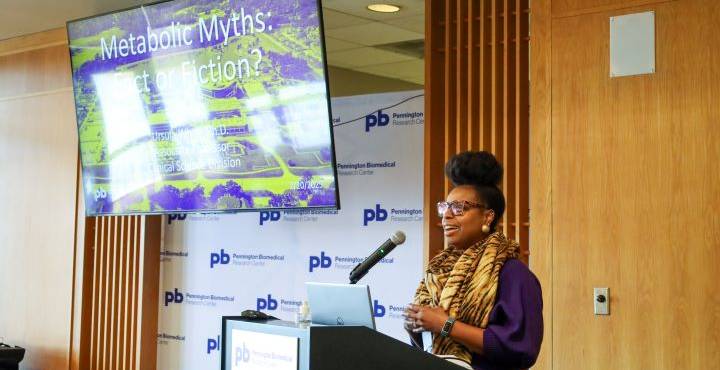The "Science of Eating" Series: Metabolic Myths
April 4, 2025 · Baton Rouge, LA
 Every day, we are bombarded with advertisements, articles and social media influencers
telling us how to lose weight or live a healthier life. Sorting through all the conflicting
messaging can often be exhausting, confusing, and sometimes even dangerous if misinformed.
Every day, we are bombarded with advertisements, articles and social media influencers
telling us how to lose weight or live a healthier life. Sorting through all the conflicting
messaging can often be exhausting, confusing, and sometimes even dangerous if misinformed.
As part of Pennington Biomedical’s Science of Eating series, Associate Professor of Clinical Science, Dr. Ursula White, recently led an informative discussion to debunk some common myths and explain the science behind the misperceptions.
The number one myth she immediately set out to dispel was that obesity is a lifestyle choice that can be avoided by simply exercising more and eating less. Dr. White explained that obesity is a disease, and that although nutrition and regular physical activity should be prioritized, other factors including biology, genetics and social determinants of health all play a role in the disease.
Those who live with obesity are at increased risk for other complications, including heart disease, type 2 diabetes, many cancers, hypertension and reproductive disorders. Dr. White’s discussion touched on many of these complications because “you can’t address obesity without addressing the other associated diseases,” she explained.
Dr. White said many people still believe that type 2 diabetes is caused by just eating too much sugar, but it is more complicated than that. Eating too much sugar can lead to obesity, which is a risk factor for type 2 diabetes. Dr. White also pointed out that type 1 diabetes is actually an autoimmune disease.
Dr. White dispelled a number of myths surrounding cardiovascular disease, including that although cardiovascular disease is the leading cause of death in the United States, hypertension (not cardiovascular disease) is known as the “silent killer.”
Dr. White also discussed dementia. Many people fear that if a family member is diagnosed with it, they will be, too. Dr. White stressed that while genetics does play a role, it is not the deciding factor. Likewise, age is a risk factor but does not dictate whether or not you will be diagnosed with dementia, and while memory loss can be a symptom of dementia, it does not necessarily signify dementia. Risk factors for dementia include hypertension, obesity, and physical inactivity, all of which can be addressed or treated.
Dr. White reminded the audience that people do not need to lose a large amount of weight to reap the health benefits. “You can lose as little as five percent of your body weight and see health improvements. If you are 200 pounds, that would be a loss of 10 pounds,” she said.
Unfortunately, maintaining weight loss is harder than losing it. Dr. White said that Pennington Biomedical scientists are working to find ways to make maintaining weight loss easier. Many have asked her what diet is the best, and she said the best one is the one that you will adhere to.
Story by the Pennington Biomedical Research Foundation. More information on the Foundation is available at https://pbrf.org/.
For more information contact:
Joe Coussan, Media Relations Manager, joe.coussan@pbrc.edu, 225-763-3049 or Ernie Ballard, Senior Director of Communications & Marketing, ernie.ballard@pbrc.edu, 225-263-2677.
About the Pennington Biomedical Research Center
The Pennington Biomedical Research Center is at the forefront of medical discovery as it relates to understanding the triggers of obesity, diabetes, cardiovascular disease, cancer and dementia. Pennington Biomedical has the vision to lead the world in promoting nutrition and metabolic health and eliminating metabolic disease through scientific discoveries that create solutions from cells to society. The Center conducts basic, clinical and population research, and is a campus in the LSU System.
The research enterprise at Pennington Biomedical includes over 600 employees within a network of 44 clinics and research laboratories, and 16 highly specialized core service facilities. Its scientists and physician/scientists are supported by research trainees, lab technicians, nurses, dietitians and other support personnel. Pennington Biomedical is a globally recognized state-of-the-art research institution in Baton Rouge, Louisiana. For more information, see www.pbrc.edu.
Pennington Biomedical Research Center
6400 Perkins Road
Baton Rouge, LA 70808



